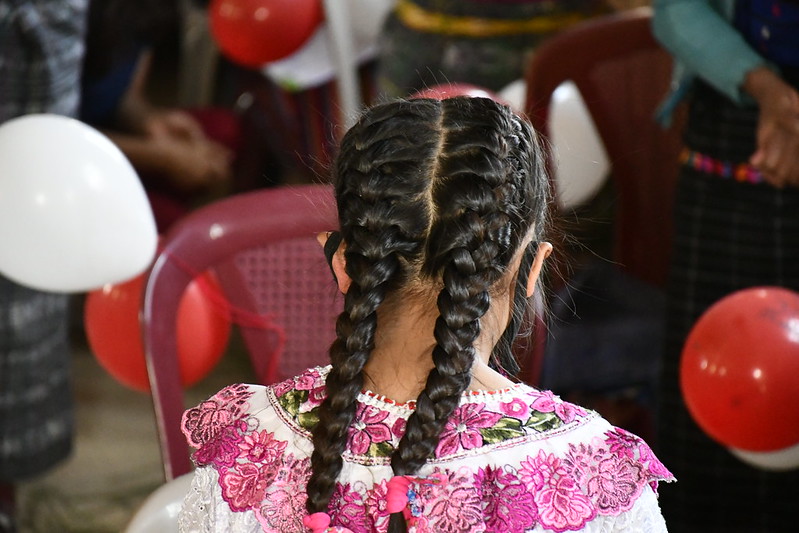News
For two indigenous girls in Guatemala, early unions spell the end of dreams
- 14 February 2022
News
ALTA VERAPAZ and TOTONICAPÁN, Guatemala – At 15, Quetzali* had only ever spoken via telephone to a 22-year-old soldier she met through her aunt. He persuaded her to meet his family, but when Quetzali went to his house in a different town, he barred her from leaving. And that is how she ended up in a couple not of her choosing: “At first I felt pressured and confused. Then I felt disappointed and deceived.”
There was no proposal, engagement or wedding. “I didn’t want to but he and my aunt insisted. At first my parents did not agree with the union, but he offered 5,000 quetzales [about $650] as long as I dropped out of school,” she recalled. “My parents were finally convinced. We were also in great need of money so I accepted the union.”
Unions as a way out
Child marriage has been described as an invisible problem in Latin America and the Caribbean – the only part of the world that hasn’t seen significant declines of the harmful practice in the past 25 years. Child marriage here usually takes shape in informal unions, or living together, and one in four girls are married or in early union before they turn 18. In Guatemala, where the legal age is 18, the prevalence is 29.5 per cent, among the highest in the region. It is common among indigenous and rural communities. Even if there are minimum ages for marriage in many countries, informal unions fly under the radar of law enforcement or under-18 marriage is allowed with parental, guardian, religious or authority consent.
Whatever the terminology, the consequences are much the same. (Though informal unions confer fewer protections like alimony and child support than in marriages recognized by the state. Men abandoning partners is common, as is denying paternity.) Girls are at risk of violence at the hands of partners and in-laws, even if they entered the union to escape violence at home. Dropping out of school compromises future job prospects and economic stability, even if, like Quetzali, they chose a union to lift them out of poverty. (In her department of Alta Verapaz, 83.1 per cent of the population lives below the poverty line. Her family never received the promised bride price.) And if girls were hoping to find freedom from strict parents or a stifling household, they discover new restrictions placed on them by partners from what to wear to who they’re allowed to see.
Adjusting to married life
Daniela*, 19, and her 20-year-old partner lived together for two years before they legally wed recently. Though hers is considered a love marriage, she, too, left to ease the financial burden on family — her mother raising two children alone in Totonicapán Department, where the poverty rate is 77.5 per cent. “Some days we did not have food, my clothes were mostly given to me by neighbors, and on many occasions we did not have money for studies or medicine,” she said. “I wanted to free my mother of expenses.”

The couple dropped out of high school – he works as a bricklayer while she cooks and cleans for him and his family. “Now I have food three times a day. They are not banquets, but I am no longer hungry.”
She also no longer has friends because she doesn’t go out (“Surely the friends I had are deep in their studies, and their lives are different than mine”). Her independence is another casualty. “I need to ask permission to leave. I cannot decide for myself, for example, to go visit my mother,” Daniela explained. “I had to tell him before I could respond to this interview. Everything I do has to be approved by my husband.”
No fairy tale endings
After a few months, Quetzali’s partner turned physically and emotionally abusive. He would give her 65 cents for expenses. And when she became pregnant, he denied the baby was his and sent her back to her family. “It is very difficult to take care of my son alone,” said Quetzali, now 16. “I am afraid of not being able to support him since I don’t have any schooling. I want to finish my studies all though it seems impossible.”
If Daniela’s circumstances were different, she would have gotten an education and a job before entering a teen union. She would support girls in her situation (“I would tell them that problems aren’t solved by getting married”) and help out her mother and brother. She would find a way to pursue a career in medicine. Instead, she said, “My dreams have been cut short.”
UNFPA works with such organizations as NGO AFEDOG and the Population Council to help end child marriage in Guatemala.
*Names changed for privacy and protection